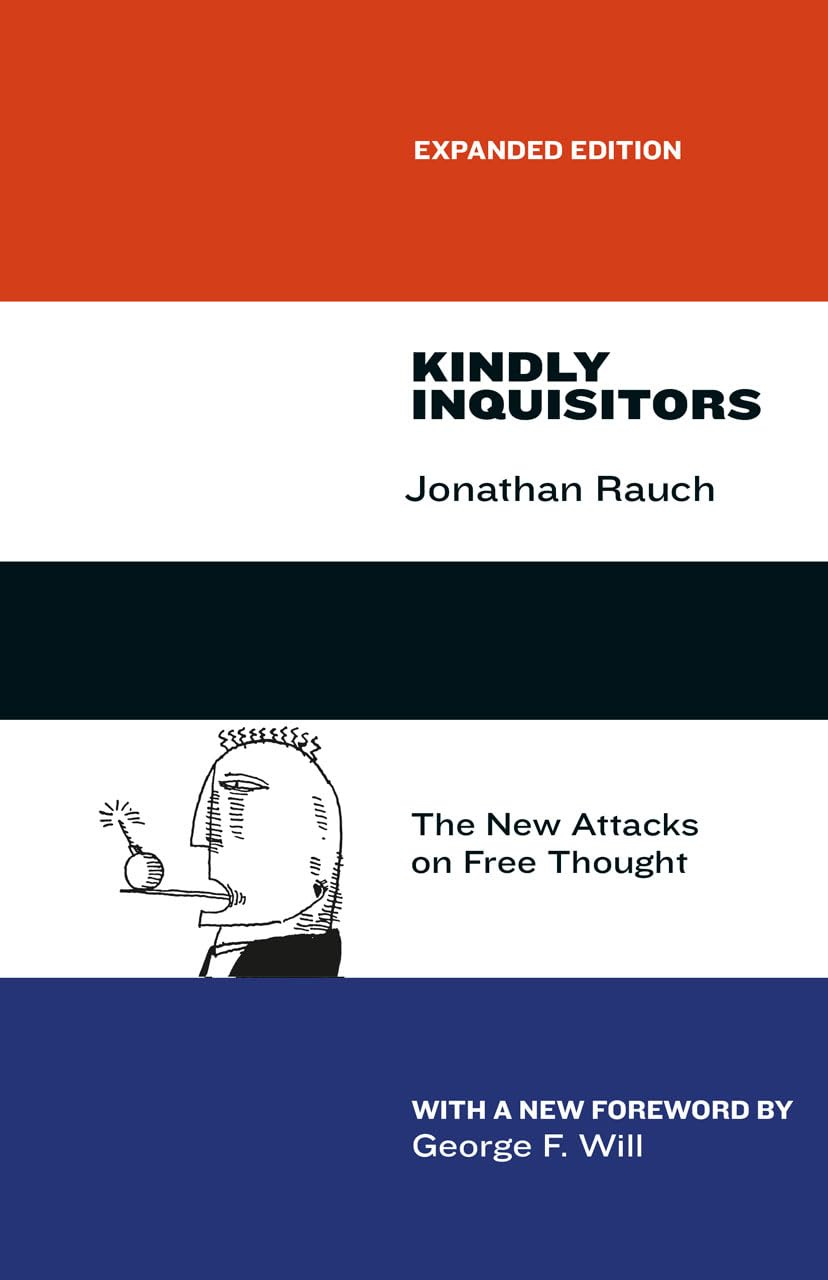Kindly Inquisitors, a Gentle Interrogation
Q: Jonathan Rauch’s Kindly Inquisitors is against cancel culture, and against punishing hate speech—sounds interesting. Tell me about it.
A: It’s more broadly a defense of what Rauch calls “liberal science.” Liberal science “uses intellectual resources efficiently, it settles differences of opinion peacefully, and it inherently blocks the political manipulation of knowledge.” The alternatives don’t, or don’t do those things as well. Liberal science therefore is the way to go. But freedom of expression is part of liberal science, so hate speech (etc) must be permitted.
listed it as “required reading” for free speech 101.Q: You’ve told me what liberal science “does” but not how it does it, or what it is.
A: One foundational principle of liberal science, Rauch says, is “the skeptical rule”:
No one gets the final say: you may claim that a statement is established as knowledge only if it can be debunked, in principle, and only insofar as it withstands attempts to debunk it.
Q: Okay, so if knowledge requires “attempted debunkings,” and (Rauch says this elsewhere) if knowledge requires criticism, and encounters with opposing ideas, then, since speech restrictions work against such encounters, they, what, make it harder to know stuff? And since knowledge is good, we shouldn’t restrict speech?
A: I think that’s it.
Q: So I see a path from the skeptical rule, to freedom of expression. But is the skeptical rule true? What arguments or evidence does Rauch offer for it?
A: He’s not really trying to argue for it. In fact he says that it is “impossible to show that ... the skeptical rule ... is ‘true’ in any grand or final sense.”
Q: I’d be happy if he showed it to be true-without-quotes, in a non-final sense. What do those qualifications mean?
A: I’m not sure. But surely the principle is plausible on its face. Untested hypotheses aren’t knowledge! How much defense does it really need?
Q: I think it’s false.
A: Wait, what?
Q: So, ancients who believed the sun went round the earth didn’t know the sun went around the earth, because falsehoods can’t be known: truth is a condition on knowledge. But it’s not the only one. If I believe you have one hundred twenty-five books in your house, and my belief is true, but I was just guessing, I still lack knowledge. So what are the other conditions on knowledge? Rauch’s skeptical rule proposes one, but it is too strong. Knowledge is possible, without meeting his condition.
A: Actually, the rule is a condition on when “you may claim that a statement is established as knowledge.”
Q: I don’t know what all those extra words are for. Suppose someone believes, say, that price caps cause shortages; but they keep quiet about it. They never claim they know it, much less that it is “established as knowledge.” Surely the interesting question is whether they know, not whether they are permitted to “claim” they know. If they do know, aren’t they automatically permitted to claim as much?
A: Why do you think the skeptical rule is false?
Q: Back up for a sec. Take this idea: if you have enough good evidence for something, so that it outweighs any evidence against it, then you know it. Right? Meeting this condition is enough for knowledge. For example, we know the earth is round because our evidence for it (ships disappear below the horizon before their sails etc), outweighs the evidence to the contrary (it “looks flat” to the naked eye).
A: Yeah, that sounds plausible.
Q: But then the skeptical rule is false. Surely I could have enough good evidence for something, even if no attempts have been made to debunk it, it has not prevailed in a debate with opposing ideas, etc?
A: How’s that? The earth is round has survived plenty of debunking attempts.
Q: Use a simpler example. Look, there’s an apple on the table between us. You and I both believe, and know, that there’s an apple there. It’s not some random guess. Our eyes provide us all the evidence we need. But this belief has not survived any debunking attempts. It hasn’t survived any criticism. We haven’t argued with anyone who believed otherwise.
A: ...
Q: Rauch says that “knowledge comes from a social process. Knowledge comes from people checking with each other.” Elsewhere: “Liberalism holds that knowledge comes only from a public process of critical exchange.” These are his central claims, but they are false. There’s no checking and no “social/public process” happening in here, when we look and come to know there’s an apple. (Don’t say that your presence makes it “public”; I could know it if you weren’t here.) Sometimes, a fact can be known without any of that. And it’s not good, if your defense of free speech rests on a false principle.
A: Maybe all he means is that many important things cannot be known without the criticism and the checking.
Q: There’s no such hedging in the statements we quoted.
A: [Flips through the book.] Wait, what about this?:


